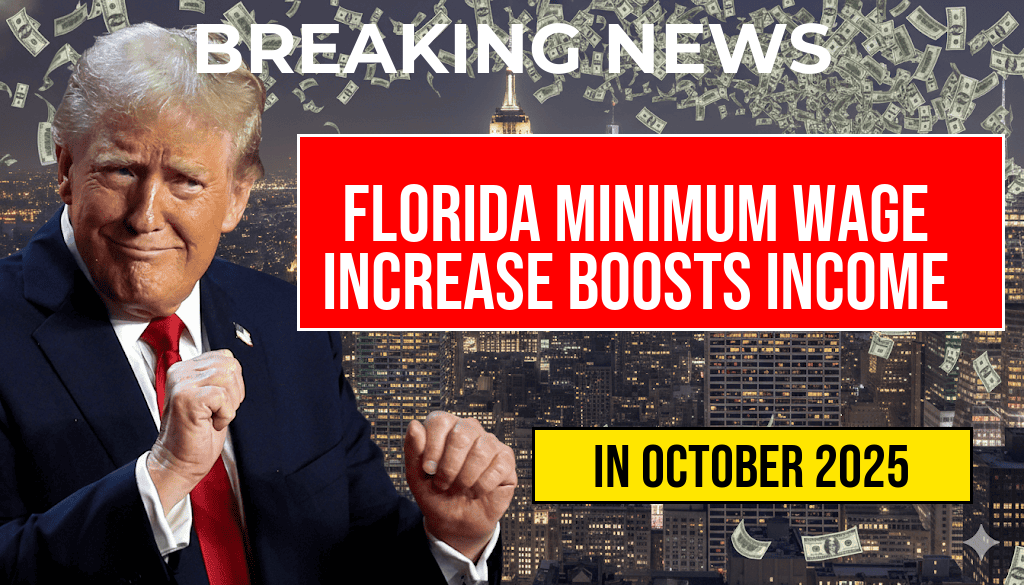Florida’s minimum wage is set to rise to $14 per hour starting September 2024, marking a significant increase from the current $13.25. This adjustment, mandated by the state’s scheduled annual inflation adjustment process, is anticipated to boost the annual earnings of full-time workers by approximately $2,080. For many low-wage earners, this change could translate into more financial stability, but it also raises questions about potential impacts on employment, business costs, and overall economic activity within the state. The increase aligns Florida with a broader national trend toward higher minimum wages, reflecting ongoing debates about living costs and income inequality across the country.
Details of the Wage Increase and Its Scope
Florida’s minimum wage law, enacted in 2020, requires annual adjustments based on the Consumer Price Index (CPI). The upcoming increase elevates the state’s wage floor from $13.25 to $14, effective September 2024. This change affects a wide array of sectors, including retail, hospitality, healthcare, and public services, where minimum wage workers constitute a significant portion of the workforce.
| Current Wage ($/hour) | New Wage ($/hour) | Weekly Hours (40 hrs) | Annual Increase |
|---|---|---|---|
| $13.25 | $14.00 | 40 | $2,800 |
| Estimated Increase in Annual Income: $2,080 | |||
Assuming a full-time schedule of 40 hours per week, the wage increase results in an additional $2,080 annually. This figure represents a meaningful boost for workers earning minimum wage, especially in a state where living costs are steadily rising. The increase is also expected to influence local economies, as workers have more disposable income to spend on goods, services, and housing.
Economic Implications for Workers and Employers
Benefits for Low-Income Earners
Advocates argue that the wage hike will reduce financial hardship among low-wage workers, providing greater capacity to cover essentials like rent, food, and healthcare. “This increase is a step toward addressing income inequality and ensuring that workers are compensated fairly for their labor,” said Laura Chen, director of the Florida Workers’ Advocacy Group. For many, the additional earnings could mean fewer hours spent in food insecurity or housing instability.
Potential Challenges for Employers
Conversely, some business owners express concern about the increased labor costs. Small businesses, in particular, face the challenge of balancing higher wages with maintaining profitability. “While supporting fair wages is crucial, the rise could lead to increased prices for consumers or adjustments in staffing levels,” noted Mark Ramirez, owner of a Miami-based restaurant. Labor cost increases may also prompt some businesses to invest more heavily in automation or to limit hiring growth, which could influence employment opportunities in certain sectors.
Broader Context and State Policy Trends
Florida’s wage adjustment is part of a broader movement among states and municipalities to address wage disparities. Several states, including California and New York, have adopted higher minimum wages, often phased in over several years. The federal minimum wage remains at $7.25, but many advocates argue that state-level increases are necessary to reflect local economic conditions.
According to data from the Wikipedia article on minimum wage, states across the U.S. are increasingly using legislative measures to set minimum wages above the federal level, citing cost-of-living differences and the need for economic justice.
Expected Impact on the Florida Economy
Economists remain divided on the overall impact of minimum wage hikes. Some studies suggest that moderate increases can stimulate local economies by boosting consumer spending, while others warn of potential job losses or reduced hours in certain industries. A report by Forbes highlights that many businesses adapt to wage hikes by increasing prices or shifting employment strategies.
Key Considerations for Policymakers and Stakeholders
- Monitoring employment levels and hours worked in low-wage sectors post-increase
- Assessing the impact on small businesses and adjusting support measures accordingly
- Ensuring that wage hikes do not inadvertently contribute to inflationary pressures
As Florida prepares for this upcoming wage adjustment, stakeholders across the spectrum continue to evaluate its potential effects. While the immediate benefit for workers is clear, long-term economic outcomes will depend on how businesses and policymakers respond to these changes.
Frequently Asked Questions
What is the new minimum wage in Florida?
The minimum wage in Florida has increased to $14 per hour.
How much could full-time workers potentially earn annually with the new minimum wage?
Full-time workers could earn an additional $2,080 annually based on the increase to $14/hour.
When did the Florida minimum wage increase take effect?
The minimum wage increase to $14/hour is effective starting from 2024.
Who benefits most from the Florida minimum wage increase?
Full-time workers earning minimum wage benefit the most, as they see a significant boost in their annual income.
Will the minimum wage increase affect part-time workers?
Yes, part-time workers earning minimum wage will also see an increase in their hourly pay, though the annual impact depends on their hours worked.






